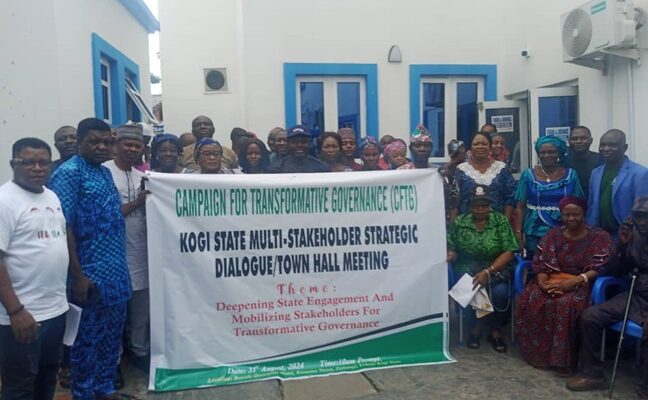Kogi citizens have been called upon to come under one platform to agitate and carry out actions and programmes towards achieving transformative governance in Kogi State and Nigeria in general.
The civil society co-convener, Campaign for Transformative Governance (CFTG), Tijani Abdulkareem made the call on Saturday at a state multi-stakeholder strategic dialogue/town hall meeting held in Lokoja.
Addulkareem, who is also the Executive Director, Socio Economic Research and Development Centre (SERDEC), argued that it will go a long way in making government accountable to drive development in the country.
“The Campaign for Transformative Governance (CFTG) State Multi-Stakeholder Strategic Dialogue/ Town Hall Meeting aims to mobilize and rally stakeholders across the state to support and engage with the CFTG’s Charter of Engagement and related initiatives.
“The Campaign for Transformative Governance (CFTG) is a platform bringing together civil society and labour in active solidarity toward demanding good governance and exploring new ways of building and consolidating actions toward promoting and ensuring transformative governance that responds to the need and aspiration of the citizens.
“The Kogi State campaign chapter is part of a National campaign group that mobilize and organize stakeholders drawn from labour and civil society toward strengthening ties, building collective voices, identifying shared aspirations and area of interest and building solidarity toward a transformative governance in the country.
“The Kogi State Charter of Partnerships, Mobilisation and Engagement (CAPME) sets out principles for improving governance in the state through participatory governance and putting the people and business at the centre of policy formulation, implementation and service delivery.
“This CAPME confirms CFTG commitment to effectively engage government and citizen in driving transformative governance. It establishes the action, results and impact of working with key stakeholders, mobilizing citizens to hold government accountable for transformative governance and inclusive development,” he said.
He argued that the thematic areas for CAPME intervention includes ensuring accessible social protection for workers and citizens to end poverty and hunger, promote participatory governance through access to public finance management information, tackling insecurity arising from illegal mining activities leading to socio-environmental issues.
Continuing, Abdulkareem said “Kogi State over the years have had its own share of bad governance in Nigeria, riddled with high rate of unemployment, unequal and unjust distribution of income and wealth, high level of insecurity, abject poverty, low level of social and political consciousness, increased illiteracy rate, poor health services, pitiable housing conditions, lack of amenities and government services, among others.
“Data from the National Bureau of Statistic (NBS 2022) shows that unemployment rate stands at 39% with the National Multidimensional Poverty Index (MPI) putting the state poverty rate at 61%, indicating that more than half of the population is now living in multidimensional poverty.
“The Under 5 mortality rate in Kogi State stands at 148, higher than the national rate of 132, making it the 9th state with the highest under-5 mortality rate in the country.
“The CAPME Intervention is to draw attention to demand social justice for the people through holding government accountable to roll back this blurring data and indicators surrounding inadequate social protection policies, unaccountable public finance management and Socio-economic and environmental issues by taking necessary action through inclusive, participatory and transformative governance toward ensuring a sustainable development.”
Earlier in his remarks, the Kogi State Chairman, Trade Union Congress (TUC), Comrade Ahmed Tijani stressed the need for collaboration to ensure good governance in Kogi State.
“TUC is committed in bringing government, civil society and the people together to ensure true transformative governance in our state. Going by the hardship happening in the country today, it is global. We are looking at how the government could come up with measures to ameliorate the sufferings of the masses.
“There is so much hardship in the country and the workers are mostly directly affected. As at today, workers can not feed three square meals a day. So we are looking forward to see that government implement the N70,000 new minimum wage approved by the Federal Government so that it will reduce the sufferings of the masses,” he stated.
In his paper presentation on “the role of civil society and labour in driving development” the Executive Director, Initiative for Grassroot Advancement (INGRA), Hamza Aliyu observed that when civil society and labor unions work together, they can create a powerful synergy that advances development goals.
Explaining further, Aliyu said “For example, CSOs might partner with unions to advocate for better labor standards or address issues like child labor. Both sectors often engage in grassroots mobilization, which can drive local and national change. Their efforts can help build a more informed and active citizenry, capable of driving development initiatives from the ground up.
“In recent years, the collaboration between civil society and labor unions has extended to various social justice issues, including gender equality, environmental protection, and anti-corruption. They have been involved in campaigns such as the #EndSARS movement, which addressed police brutality and called for systemic reforms.”
Aliyu highlighted monitoring and evaluation impact, strengthening institutional capacity, promoting inclusivity and diversity, building of alliances with other stakeholders, addressing conflicts and challenges, aligning goals and objectives, building trust and mutual respect, leveraging strengths and resources, engaging in Joint Advocacy and Campaigns, focusing on grassroots mobilization as some of the strategies for effective partnership.




